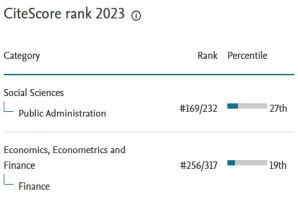Adóelkerülés – Egy magatartás hátteréről
DOI:
https://doi.org/10.35551/PFQ_2024_4_1Kulcsszavak:
adózó, adózói magatartás, Kúria, adóelkerülés, bírósági gyakorlat, H26, H30, K34Absztrakt
Kutatásunk az adózói döntések „fekete doboznak” számító hátterének feltárására irányult, általánosítható magatartási mintázatok keresésére. Az elemzés a Kúria nyilvánosságra hozott 2018–2023 közötti döntéseire épült. Az ítéletek információit átültettük a statisztikai adatfeldolgozás rendszerébe, így 39 változót hoztunk létre. A változókat és azok összefüggéseit az SPSS statisztikai programmal elemeztük. A statisztikai mintába 120 felülvizsgálati döntés került be, ezek megfelelően reprezentálták az időszak felülvizsgálati ügyeit. Tanulmányunk – a statisztikai tapasztalatok mellett – feldolgozta az adóelkerülésről megfogalmazott szakirodalmi modelleket, és egyedi adótényállásokat is rekonstruált.
Hivatkozások
Allingham, M., & Sandmo, A. (1972): Income tax evasion: A theoretical analysis. Journal of Public Economics, 1 (3-4), pp 323-338.
Alm, J.; Kirchler, E.; Muelbacher, S.; Gangl, K.; Hofmann, E.; Kogler, C. & Pollai,
M. (2012): Rethinking the research paradigms for analysing tax compliance behaviour. CESifo Forum, 2.
Barabási Albert-László (2005): A hálózatok tudománya. Libri, Budapest.
Émile Durkheim: Az öngyilkosság. Szociológiai tanulmány. (ford. Józsa Péter, bev. Cseh-Szombathy László) Közgazdasági és Jogi, Budapest, 1967.
Erard, B. & Feinstein, J. S. (1994): The role of moral sentiments and audit perceptions in tax compliance. Public Finance/Finances Publiques 49,pp 70-89.
Erzo F. P. Luttmer & Monica Singhal (2014): Tax Morale. Journal of Economic Perspectives,28 (4) pp 149-168.
Gangl, K., Hofmann, E. & Kirchler, E. (2012): Tax Authorities’ Interaction with Taxpayers: Compliance by Power and Trust, WU International Taxation Research Paper Series No. 2012 – 06, Wien, pp 25.
Guala, F. & Mittone, L. (2005): Experiments in economics: External validity and the robustness of phenomena. Journal of Economic Methodology, 12, pp 495-515
Gyekiczky Tamás (203): Az Európai Bíróság ítélete a magyar adóügyekben. A hozzáadottérték-adó levonásához való jog adóhatósági megtagadásáról. Jogesetek Magyarázata (JEMA), Budapest, pp 42-54.
James Alm & Benno Torgier (2011): Do Ethics Matter? Tax Compliance and Morality Author(s). Journal of Business Ethics 101(4), pp 635-651.
John Mowbray (2016): Ethics and tax compliance: the morality of tax avoidance. The good old days. Trusts & Trustees, 22 (1) pp 166 – 167.
José A. Noguera, Francisco J. Miguel Quesada, Eduardo Tapia &Toni Llàcer (2014): Tax Compliance, Rational Choice, and Social Influence: An Agent-Based Model. Im.: Revue française de sociologie (English Edition), 55(4) pp 765-804.
Kastlunger, B., Kirchler, E., Mittone, L., & Pitters, J. (2009): Sequences of audits, tax compliance, and taxpaying strategies. Journal of Economic Psychology, 30 (4), pp 405-418
Kirchler, E. (2007): The economic psychology of tax behaviour. Cambridge, UK: Cambridge University Press.
Kirchler, E., Maciejovsky, B., & Weber, M. (2005): Framing effects, selective information and market behavior: An experimental analysis. Journal of Behavioral Finance, 6 (1), pp 90-100.
Kirchler, E., Muehlbacher, S., Kastlunger, B., & Wahl, I. (2010): Why pay taxes? A review of tax compliance decisions. In: Alm,J., Martinez-Vazques, J. & Torgler, B.(ed.), Developing alternative frameworks for explaining tax compliance (15-31). London, UK: Routledge.
Manuel Castells (2005): A Hálózati társadalom kialakulása. Az információ kora. Gazdaság, Társadalom és kultúra. I. kötet. Gondolat – Infonia, Budapest
Mathew O. Jackson (2008): Social and Economics Networks. Princenton University Press, pp 17.
Mérei Ferenc (1988): Közösségek rejtett hálózata. Tömegkommunikációs Kutatóközpont, Budapest.
Michael A. (2020): Livingston, Tax and Culture: Convergence, Divergence, and the Future of Tax Law, Cambridge University Press.
Mittone, L., & Patelli, P. (2000): Imitative behaviour in tax evasion. In B. Stefansson & F. Luna (Eds.), Economic simulations in swarm: Agent-based modelling and object oriented programming. Amsterdam: Kluwer, pp 133-158.
NAV (2023): Évkönyv 2022. Online: https://nav.gov.hu/kiadvanyok/evkonyvek. 32.
Paraic Madigan (2016). Ethics and tax compliance: the morality of tax compliance. Trusts & Trustees, 22 (1) pp 151 – 158.
Srinivasan, T. N. (1973): Tax evasion: A model. Journal of Public Economics, 2, pp 339-346.
U. Turksen, R. Kreissl & E.T. Blumenschein (2023): The Role of Human Factors in Tax Compliance and Coutering Tax Crimes. Im: Tax Crimes and Enforcement in the European Union. Edited by Umut Turksen, Donato Vozza, Reinhard Kreissl, and Fanou Rasmouki, Oxford University Press.
Wahl, I., Muehlbacher, S., & Kirchler, E. (2010): The impact of voting on tax payments. Kyklos, 63 (1), pp 144-158.
Young-dahl Song &Tinsley E. Yarbrough (1978): Tax Ethics and Taxpayer Attitudes: A Survey. Public Administration Review, 38 (5) pp 442-452. Wiley on behalf of the American Society for Public Administration Stable URL: https://www.jstor.org/stable/975503
évi CL. törvény az adózás rendjéről 6. § (2)
C 385/12. sz. Hervis Sport- és Divatkereskedelmi Kft. kontra Nemzeti Adó- és Vámhivatal Közép dunántúli Regionális Adó Főigazgatósága-ügy [ECLI:EU:C:2014:47.].
Kfv.V.35.088/2023/7.
Kfv.V.35.109/2023/8.
Kfv.I.35.150.2019/4.
Kfv.V.35.285/2022/8.
Kfv.I.35.036/2019/9.
Kfv.I.35.620/2018/7.
Kfv.I.35.236/2018/5.
Kfv.V.35.159/2022/6.
Kfv.I.35.212/2018/5.
Kfv.V.35.465/2022/8.
Kfv.V.35.055/2023/13.
Kfv.I.35.197/2020/9.
Kfv.I.35.508/2020/6.
Kfv.I.35.474/2020/6.
Kfv.V.35.039/2022/9.
Kfv.I.35.195/2020/9.
Kfv.I.35.463/2020/5.
Kfv.I.35.222/2020/10.
Kfv.I.35.302/2020/8.
Kfv.V.35.153/2021/12.
Kfv.I.35.402/2018/7.
Kfv.I.35.096/2018/9.
Kfv.I.35.457/2020/6.
Kfv.V.35.068/2023/9.
Kfv.V.35.609/2021/8.
Kfv.I.35.407/2020/8.
Kfv.V.35.075/2023/6.
Kfv.V.35.439/2022/5.
Kfv.I.35.315/2020/8.
Kfv.V.35.639/2021/5.
Kfv.I.35.514/2020/5.
Kfv.V.35.116/2021/5.
Kfv.V.35.428/2022/7.
Kfv.V.35.379/2022/7.
Kfv.I.35.550/2019/4.
Kfv.V.35.469/2022/3.
Kfv.I.35.425/2020/4.
Kfv.I.35.123/2021/5.
Kfv.I.35.354/2018/8.
Kfv.I.35.206/2019/3.
Kfv.V.35.007/2023/6.
Kfv.V.35.247/2022/5.
Kfv.V.35.138/2023/6.
Kfv.I.35.338/2018/9.
Kfv.V.35.138/2023/6.
##submission.downloads##
Megjelent
Hogyan kell idézni
Folyóirat szám
Rovat
License
Copyright (c) 2024 Pénzügyi Szemle

This work is licensed under a Creative Commons Attribution 4.0 International License.
Authors assign copyright to Pénzügyi Szemle / Public Finance Quarterly. Authors are responsible for permission to reproduce copyright material from other sources.












